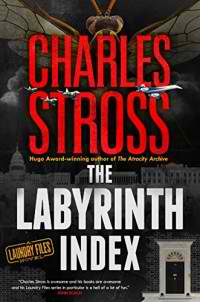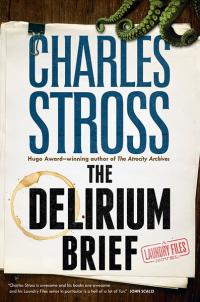A Conventional Boy by Charles Stross
 Monday, December 23, 2024 at 11:14AM
Monday, December 23, 2024 at 11:14AM 
Published by Tordotcom on January 7, 2025
The long-running Laundry Files series imagines a secret British agency that is tasked with defending Great Britain against occult threats. Since summoning a supernatural being from another dimension is essentially a math problem, supernatural incursions became more prevalent with the proliferation of computers. Laundry snatch squads capture cultists who summon demons and place them in Camp Sunshine for investigation and deprogramming.
As a boy, Derek Reilly mastered the game of Dungeons and Dragons. He did research into the occult to create new game scenarios. The government, mistaking his notes for evidence that he was summoning demons, snatched him and rendered him to Camp Sunshine. Years passed before his captors realized he was just a harmless, stuttering, mildly autistic kid, but by that point, camp authorities worried that he had absorbed too much knowledge of the supernatural to permit his safe release.
Derek has been in Camp Sunshine for thirty years, passing the time by running a Dungeons and Dragons game by mail. When he learns about a nearby Dungeons and Dragons convention, he breaks out of the camp, hoping for a taste of freedom before he turns fifty. Unfortunately, true cultists are also attending the convention.
Iris Carpenter — high priestess of the Brotherhood of the Pharaoh — now works for the Laundry, although she wears an explosive collar that will allow the government to end her life if she uses her skills to help the dark side. Iris leads the search for Derek and then joins a squad from the Laundry to put down the mischief that is arising in the hotel where the convention is being held. Supernatural action ensues.
Fans of the series will recognize Iris. Derek is (I think) new to the series. The most frequently recurring protagonist, Bob Howard, doesn’t appear in the main story, but after this novel concludes, two short stories featuring Bob round out the book.
I always enjoy Charles Stross’ Laundry Files stories, perhaps because he grounds the supernatural in math that opens portals to other dimensions, transforming the series into something that is closer to science fiction than fantasy. Generous infusions of humor make clear that the supernatural isn’t meant to be taken seriously. While some of the supernatural entities are horrific, the books are too funny to fit within the horror genre. A Conventional Boy works as an intelligent, fast-moving action story. Derek is a sympathetic, likeable character who uses his wits to save the day. What more could a reader want?
RECOMMENDED



